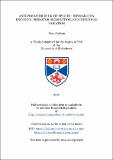Anti-predator behaviour in UK tit species : information encoding, predator recognition, and individual variation
Abstract
To combat the ever-present threat of predation many species produce anti-predator
vocalizations and behaviours (mobbing) designed to drive predators away. These
vocalizations can encode a predator’s threat level, and many species within a
community will eavesdrop on this information. To determine how prey species
produce, use, and respond to anti-predator information and how individual, social, and
phylogenetic factors of different species may influence this behaviour, I conducted a
series of robotic-predator presentation and anti-predator vocalization playback
experiments in the wild and lab. I predicted that UK Paridae would encode
information the same as previously studied species. I found that UK Paridae encode
predator information in different ways, and that neither phylogeny nor ecology
explained the patterns of similarity in how different species encode predator threat in
their calls. Flock structure appeared to affect how species encoded predator threat and
while multiple species may be sources of information for familiar flock mates, only
blue and great tits met the criteria to be community informants. As blue and great tits
need prior experience to recognize novel predators and juvenile great tits avoid novel
predators only after seeing adults mob them, tits may use mobbing calls to learn about
novel predators. While they responded to mobbing calls, juvenile blue and great tits
did not engage in mobbing behaviour although they appear capable of doing so.
Furthermore, while individuals varied in their responses to aerial alarm calls this
variation was not explained by either their proximity to the call nor their personality.
In this close examination of how anti-predator vocalizations are produced and used by
UK Paridae, I found variation in these signals. This challenges previous assumptions
about how Paridae encode information, raising questions as to the sources of this
variation.
Type
Thesis, PhD Doctor of Philosophy
Collections
Items in the St Andrews Research Repository are protected by copyright, with all rights reserved, unless otherwise indicated.

